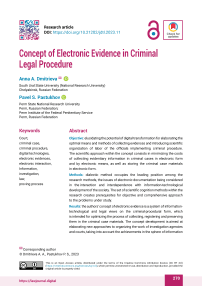Concept of Electronic Evidence in Criminal Legal Procedure
Автор: Dmitrieva A. A., Pastukhov P. S.
Журнал: Journal of Digital Technologies and Law @lawjournal-digital
Рубрика: Государство и право. Юридические науки
Статья в выпуске: 1 (1), 2023 года.
Бесплатный доступ
Objective: elucidating the potential of digital transformation for elaborating the optimal means and methods of collecting evidences and introducing scientific organization of labor of the officials implementing criminal procedure. The scientific approach within the concept consists in minimizing the costs of collecting evidentiary information in criminal cases in electronic form and by electronic means, as well as storing the criminal case materials in electronic form. Methods: dialectic method occupies the leading position among the research methods, the issues of electronic documentation being considered in the interaction and interdependence with information-technological development of the society. The set of scientific cognition methods within the research creates prerequisites for objective and comprehensive approach to the problems under study. Results: the authors’ concept of electronic evidence is a system of information-technological and legal views on the criminal-procedural form, which is intended for optimizing the process of collecting, registering and preserving them in the criminal case materials. The concept development is aimed at elaborating new approaches to organizing the work of investigation agencies and courts, taking into account the achievements in the sphere of information technologies, providing new techniques of collecting criminal-relevant, criminal-procedural, criminological significant information when investigating and hearing of a criminal case. The proposed concept is also aimed at improving interaction and in-service communication of the officials of the preliminary investigation bodies with the officials of information-technological systems for the purposes of collecting evidentiary information in electronic form. Scientific novelty: the changes were systemically analyzed, which are taking place in the contemporary information society, through the prism of the emerging problems between the sectoral criminal-procedural evidentiary law and more modern technological means of collecting evidentiary information. The article demonstrates a new approach to creating technological interaction using digital technologies, on the scientific base of organization of proving activity, intended to optimize and rationalize the process of proving in criminal procedure. Practical significance: the research materials can be used to prepare proposals on making changes and additions in the current legislation with a view of implementing the practice of already functioning models of criminal-procedural activity of foreign countries, an inexhaustible potential of information-technologies, software, and artificial intelligence to rationalize proving in criminal cases.
Court, criminal case, criminal procedure, digital technologies, electronic evidences, electronic interaction, Information, investigation, law, proving process
Короткий адрес: https://sciup.org/14127051
IDR: 14127051 | DOI: 10.21202/jdtl.2023.11


